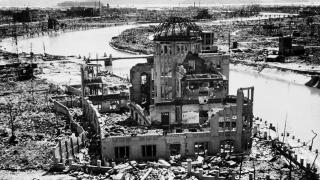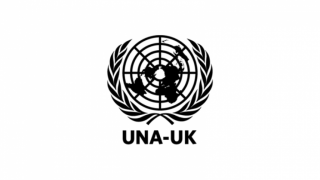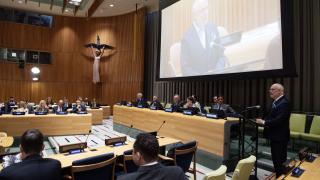
In a message to the Peace Memorial Ceremony, taking place in Japan to mark the 70th anniversary of the bombing of Hiroshima, UN Secretary-General Ban Ki-moon called for "urgent action to eliminate nuclear weapons once and for all".
Recalling the first resolution by the UN General Assembly, which reflected the world's concern about the use of atomic weapons, he urged states to honour the victims of Hiroshima and Nagasaki by realising the "vision of a nuclear-weapons-free world". His full statement is included below.
Towards the end of the Second World War - on 6 and 9 August 1945 - the United States dropped atomic bombs on Hiroshima and Nagasaki. The two cities were destroyed and more than 200,000 people died of nuclear radiation, shockwaves from the blasts and thermal radiation. Over 400,000 have died since the end of the war, from the after-effects of the bombs.
UNA-UK joins the Secretary-General in his call for a nuclear-weapons-free world. Realising this aim will require nuclear-armed states, including the UK, to take seriously their international obligation to disarm under the Treaty on the Non-Proliferation of Nuclear Weapons.
While current big power tensions make progress on disarmament difficult, they also make this goal all the more important.
Click here to read our recommendations for UK action
Hiroshima, Japan, 6 August 2015 - Secretary-General's message to Peace Memorial CeremonyI am honoured to send this message to all participants at the Peace Memorial Ceremony marking the solemn 70th anniversary of the bombing of Hiroshima. I am grateful to the organizers and all those who have gathered for this remembrance. Your commemoration should reverberate from this city across the world, reminding all people of the need for urgent action to eliminate nuclear weapons once and for all.
Seven decades after their first use in conflict, this sombre occasion commemorates the thousands who died that day. It honours the survivors and their descendants who have suffered severe adversity in the aftermath. The United Nations stands with them, resolved to realize their vision of a nuclear-weapon-free world.
My own commitment was reinforced during my visit to Hiroshima five years ago. I will always carry the memories of meeting the survivors, witnessing the destruction and seeing the lingering effects. The courage of those who lived through this catastrophic, man-made tragedy was deeply inspiring. The hibakusha are more than survivors – they are unparalleled champions of peace. From their searing experiences, they have forged a message of hope that someday the world will be free of these indiscriminate and destabilizing weapons.
I pay tribute to the bravery of the hibakusha and renew my resolve to advance our common cause of achieving a safer and more peaceful world, free of the nuclear shadow.
This year is also the 70th anniversary of the United Nations. The first resolution adopted by the General Assembly reflected the world’s concern about the use of atomic weapons. As you keep the memory of the bombing alive, so, too, must the international community persist until we have ensured that nuclear weapons are eliminated.
I echo your rallying cry: No more Hiroshimas. No more Nagasakis.
In the months after the bombing, it was said that Hiroshima would be uninhabitable for 70 years. Now, seven decades later, this vibrant city is proof of the resilience of its people and a monument to the indomitable spirit of humanity. You are an inspiration to the world, which has a responsibility to honour your experience by ensuring a world free of nuclear weapons.






